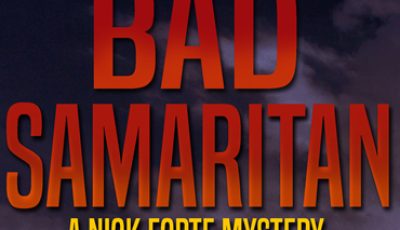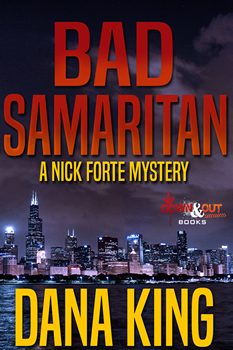

Bad Samaritan by Dana King
 Nick Forte has a hard time leaving well enough alone. He seriously injures a man for slapping a woman Forte has never seen before, so when Becky Tuttle comes to him with disconcerting letters sent to her author alter ago Desiree d’Arnaud, he does more than a cursory investigation. Following the thread of Becky’s problem leads through a local cop who takes the situation too lightly for Forte’s taste and into the disturbing world of men’s rights activists, for whom he has no use at all.
Nick Forte has a hard time leaving well enough alone. He seriously injures a man for slapping a woman Forte has never seen before, so when Becky Tuttle comes to him with disconcerting letters sent to her author alter ago Desiree d’Arnaud, he does more than a cursory investigation. Following the thread of Becky’s problem leads through a local cop who takes the situation too lightly for Forte’s taste and into the disturbing world of men’s rights activists, for whom he has no use at all.
Becky’s case isn’t the only thing going on in Forte’s life. A chance meeting with Lily O’Donoghue, a former prostitute whose mother’s death Forte feels responsible for, leads to a blackmailer who has videos of Lily’s former occupation. Forte takes care of the blackmailer with minimal fuss, but learns (again) that no good deed goes unpunished. Forte’s innocent intercession brings him back into the sphere of Chicago gangster Mickey Touhy, who has interest in both Lily and Forte.
Forte’s usual cast of Sharon, Goose, Delbert, Sonny, Jan, and, of course, his daughter Caroline, do what they can to keep him on an even keel. The problem is that Forte’s keel may be permanently damaged and the only resolutions he can arrive at satisfy no one, least of all himself.
Two-time Shamus Award nominee Dana King spent some time with The Big Thrill discussing his latest mystery, BAD SAMARITAN:
What do you hope readers will take away from this book?
A pleasant several hours that entertained them while making them think—or even become aware of—something that they might not have thought about before. I believe a book needs to be entertaining before it can be anything else. Not that it has to be funny—though I do make a point to lighten the mood from time to time—but it’s better to slip in the points you want to make rather than beating people over the head with them.
How does this book make a contribution to the genre?
Questions like this always scare me. It seem so pretentious to proclaim my book “has made a contribution to the genre.” That said, I’d like to think that, if nothing else, it helps to show there’s still a lot of life left in PI stories, and that we’ll never run out of the different kinds of stories PIs are uniquely suited to tell.
Was there anything new you discovered, or that surprised you, as you wrote this book?
Oh, my, yes. I was sort of aware of men’s rights activists, but I had no idea of the depths MRAs, MGTOWs (Men Going Their Own Way), pick-up artists, rape deniers, and other self-emasculating cowards are willing to sink. My rule of thumb is that if I’m not enjoying my research I’m probably writing the wrong book. I made an exception here, though I felt like I should shower after every Google session. There are men who have legitimate grievances with family court decisions and such, but these six-legged morons have corrupted the term “men’s rights advocate” irredeemably.
No spoilers, but what can you tell us about your book that we won’t find in the jacket copy or the PR material?
Sex. Not a great deal, and it’s not “Fifty Shades of Forte” or anything, but this is the raciest book I’ve written by far.
What authors or books have influenced your career as a writer, and why?
When I first started writing PI stuff I would have said, “Raymond Chandler” and left it at that. As I age and, hopefully, grow as a writer, I find Dashiell Hammett far more of an influence. I still love Chandler’s work, but as a writer Hammett’s gift for getting in, telling the story, and getting out appeals to me. Not that there’s no room for the well-turned phrase, but Hammett didn’t do it to draw attention to the writing; he did it to move the story. He also never saw the need to use eleven words when seven would do.
The other big influence is George V. Higgins, especially The Friends of Eddie Coyle. He showed there’s no limit to how much of the story can be told through dialog. I stand second to no one in my admiration of Elmore Leonard, but even he said he got his approach to dialog from Higgins. From Leonard I learned to keep the dialog witty.
*****
 Dana King has two Shamus Award nominations, for A Small Sacrifice and The Man in the Window. His Penns River series of police procedurals includes Worst Enemies and Grind Joint, and Resurrection Mall (all published by Down and Out Books). A short story, “Green Gables,” appeared in the anthology Blood, Guts, and Whiskey, edited by Todd Robinson. Other short fiction has appeared in Spinetingler, New Mystery Reader, A Twist of Noir, Mysterical-E, and Powder Burn Flash. His newest book is A Dangerous Lesson.
Dana King has two Shamus Award nominations, for A Small Sacrifice and The Man in the Window. His Penns River series of police procedurals includes Worst Enemies and Grind Joint, and Resurrection Mall (all published by Down and Out Books). A short story, “Green Gables,” appeared in the anthology Blood, Guts, and Whiskey, edited by Todd Robinson. Other short fiction has appeared in Spinetingler, New Mystery Reader, A Twist of Noir, Mysterical-E, and Powder Burn Flash. His newest book is A Dangerous Lesson.
To learn more about Dana, please follow his blog, One Bite at a Time. He lives in quiet near seclusion with The Beloved Spouse.
- AudioFile Spotlight: March Mystery and Suspense Audiobooks - March 17, 2025
- Africa Scene: Shadow City by Natalie Conyer - March 17, 2025
- The Ballad of the Great Value Boys by Ken Harris - February 15, 2025
